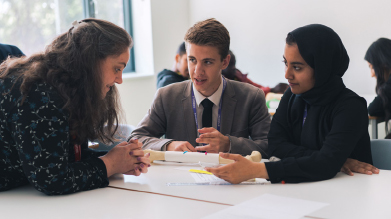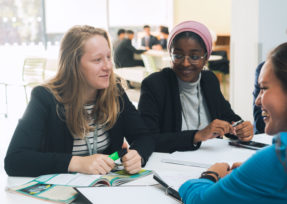Psychology
Psychology
Studying behaviour and the human mind, A level Psychology develops strong research and analytical skills. Engaging in a range of experiments and research projects, students will explore normal and abnormal human behaviours.

Course Description.
Psychology is an increasingly popular A level choice at University of Birmingham School, and we are proud to offer such a fascinating yet academically challenging subject.
When considering whether or not to study Psychology, the question we are most often asked is ‘what is it?’ Psychology is defined as the scientific study of mind and behaviour. The reality is that everybody has an experience of the applications of psychology in the real world, but don’t often realise how they came about.
For example, did you know that the reason why sensitive material cannot be shown on television before 9pm is because of a study by Bandura (1966) that showed that young children imitate violence they see on television? Did you know that maternity leave policy is set as a result of research into the importance of a secure attachment in early childhood? And of course, psychology has contributed to our understanding of (and most importantly, treatment of) a range of mental disorders, recognising that a positive mental health is as important for humans as a good physical health.
However, this knowledge and understanding does not come about through chance or speculation. Psychology is a science, and is subject to the same scientific rigours as the natural sciences. Theories require evidence, and this evidence has to be reliable and valid. This can often cause us problems – humans are not chemicals in a test tube, or bacteria in a petri dish. We are independent, free willed, highly intelligent beings and do not always behave as psychologists in a lab may predict. This can often cause issues for research and drawing conclusions about human behaviour.
‘Mind’ and ‘Behaviour’ are broad terms, so it is of no surprise that we learn a diverse range of topics at A level. In Year 12, we study Social Influence, Memory, Attachment, Biopsychology, and Psychopathology. In Year 13, we look at key Issues & Debates in Psychology, Gender, Schizophrenia and Forensic Psychology.
Psychology complements the natural sciences well due to the basis of the scientific method within its study, but it also teaches you critical thinking and allows you to work on and develop your analytical essay writing skills. As a result, Psychology has cross overs with most other A level subjects, and if a student does not go on to study Psychology or related subjects at university, then they have developed skills that will be useful and necessary for any other degree course.
Key Information
Department
Psychology
Subject Leader
Miss J Winwood
Exam Board
AQA
Contact
Admissions enquiries
e: admissions@uobschool.org.uk

















